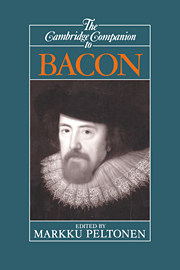Book contents
- Frontmatter
- Introduction
- 1 Bacon's idea of science
- 2 Bacon's classification of knowledge
- 3 Bacon's method of science
- 4 Bacon's forms and the maker's knowledge tradition
- 5 Bacon's speculative philosophy
- 6 Bacon as an advocate for cooperative scientific research
- 7 Bacon's science and religion
- 8 Bacon and rhetoric
- 9 Bacon and history
- 10 Bacon's moral philosophy
- 11 Bacon's political philosophy
- 12 Bacon's legacy
- Bibliography
- Index
8 - Bacon and rhetoric
Published online by Cambridge University Press: 28 May 2006
- Frontmatter
- Introduction
- 1 Bacon's idea of science
- 2 Bacon's classification of knowledge
- 3 Bacon's method of science
- 4 Bacon's forms and the maker's knowledge tradition
- 5 Bacon's speculative philosophy
- 6 Bacon as an advocate for cooperative scientific research
- 7 Bacon's science and religion
- 8 Bacon and rhetoric
- 9 Bacon and history
- 10 Bacon's moral philosophy
- 11 Bacon's political philosophy
- 12 Bacon's legacy
- Bibliography
- Index
Summary
Given the important place occupied by rhetoric in Bacon's career, one might imagine that by this late date an abundance of serviceable studies would exist. But, perhaps as another proof of his observation that “the opinion of plenty is amongst the causes of want” (111, 327-8)) such is not the case. There are three book-length studies frequently cited: Karl R. Wallace's pioneering study, Francis Bacon on Communication and Rhetoric, Lisa Jardine's revised Cambridge dissertation, Francis Bacon: Discovery and the Art of Discourse, and the overall history by W. S. Howell, Jr., Logic and Rhetoric in England, 1500-1700. There are also some shorter essays, of varying value.' But it is not being unkind to say that none of these offers a satisfactory account of either Bacon's theory or practice of rhetoric. In some cases major emphases in Bacon's theory have simply not been registered, or were misunderstood. In others, the writers' evaluation of Bacon was adversely affected by their general conception of rhetoric, and the place it held in European intellectual life.
- Type
- Chapter
- Information
- The Cambridge Companion to Bacon , pp. 200 - 231Publisher: Cambridge University PressPrint publication year: 1996
- 20
- Cited by

